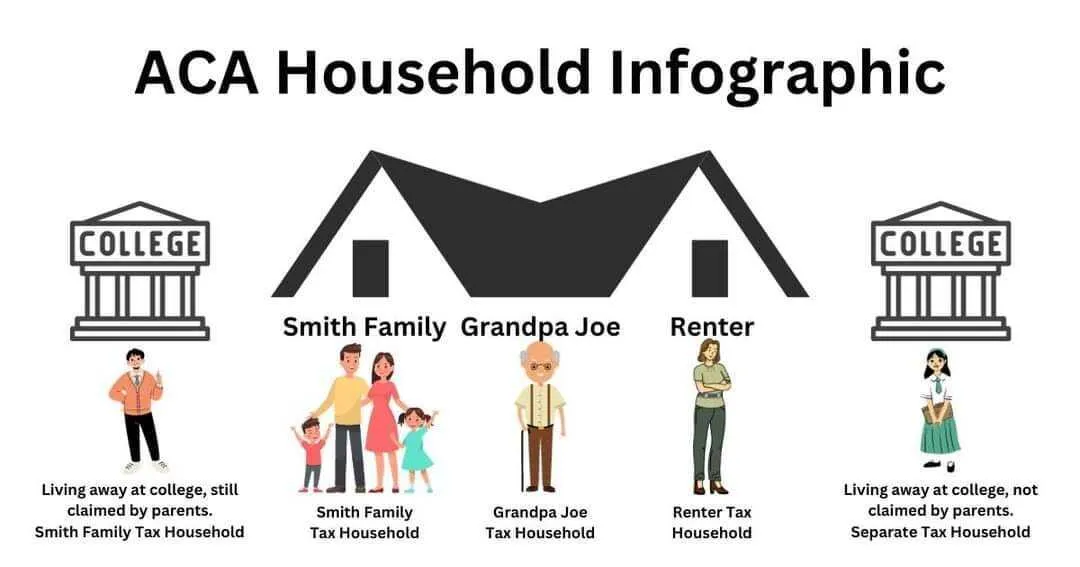
Large Call to Action Headline

Income Management
Calculating Your Household Income for Marketplace Coverage: What Counts and What Doesn’t
When applying for health insurance through the Marketplace, you’ll need to estimate your Modified Adjusted Gross Income (MAGI).Your tax household includes everyone you claim as a dependent on your tax return, even if they have separate insurance. Here’s a quick guide to help:
Income - What Counts
Gross
BEFORE TAX
Job (Salary, wages, tips)
Unemployment
ALL Social Security
Retirement (IRA/401(K)) Income
Pension Benefits
Disability Income
Alimony Received (>2019)
NET
AFTER TAX
Job (Salary, wages, tips)
Unemployment
ALL Social Security
Retirement (IRA/401(K)) Income
Pension Benefits
Disability Income
Alimony Received (>2019)
Not Applicable
IGNORE
Job (Salary, wages, tips)
Unemployment
ALL Social Security
Retirement (IRA/401(K)) Income
Pension Benefits
Disability Income
Alimony Received (>2019)

Income That Counts:
Wages and salaries (before taxes)
Self-employment income (after business deductions)
Social Security benefits (including retirement and disability, but not SSI)
Retirement or pension income
Unemployment compensation
Rental or royalty income
Alimony (if divorce was finalized before 2019)
Investment income (interest, dividends, capital gains)
Tips or bonuses
Taxable scholarships or grants
Income That Does NOT Count:
Child support
Supplemental Security Income (SSI)
Gifts or financial support from others
Loans
Workers’ compensation
Income tax refunds
Non-taxable VA benefits
Life insurance payouts
For guidance, you can refer to your most recent tax return. This amount will generally be similar to Line 11 on Form 1040 if your income is expected to be close to that amount. If you’re unsure about specific income details, please consult a CPA for assistance.
Self-Employed? Here's How to Estimate Your Income

If you're self-employed—whether you're a freelancer, gig worker, or small business owner—you'll need to estimate your net self-employment income when applying for Marketplace coverage. This is your total income minus business expenses.
What to Include:
Income from freelance or contract work
Earnings from your business or side hustle
Rideshare or delivery income (e.g., Uber, Lyft, DoorDash)
What to Subtract (Allowable Business Expenses):
Office supplies and equipment
Advertising and marketing costs
Business travel and mileage
Home office expenses
Internet and phone bills (portion used for business)
Other allowable business expenses not shown here
Tip: If your income varies, use your best estimate for the entire year. You can update it later if your income changes.

Estimating Unpredictable Income

When your income fluctuates, estimating your annual income can be challenging. Here's how you can approach it:
What to Include:
Review Past Income:
Look at your income from previous years to identify patterns or averages.
Consider Current Trends:
Account for any recent changes in your business that might affect income.
Project Monthly Income:
Estimate your average monthly income and multiply by the number of months you expect to work.
Example: If you earn approximately $1,500 per month from freelance graphic design and plan to work all 12 months:
$1,500 × 12 months = $18,000 estimated annual income
If you also anticipate earning $500 per month from tutoring for 6 months:
$500 × 6 months = $3,000 additional income
Total Estimated Annual Income: $18,000 + $3,000 = $21,000
Note: This is a simplified example. Be sure to account for any business expenses to determine your net income.

⚠️ Important Disclaimer
This page is intended to help you estimate your income for Marketplace purposes. It is not tax advice. Each tax household is responsible for ensuring their income estimate is as accurate as possible. This matters because any Advanced Premium Tax Credit (APTC) received will be reconciled when you file your taxes the following year. If your estimate is too low, you may owe money back. If it's too high, you may get a refund. When in doubt, consult a tax professional. At Mere we are not tax professional

Quick Links

Schedule a Call

Contact Us
Disclaimer
Not affiliated with or endorsed by Medicare, Social Security, Healthcare.gov, or any government agency.
Need Help? The MereCare Team is here for you year-round.

© Copyright 2025. Mere Benefits.